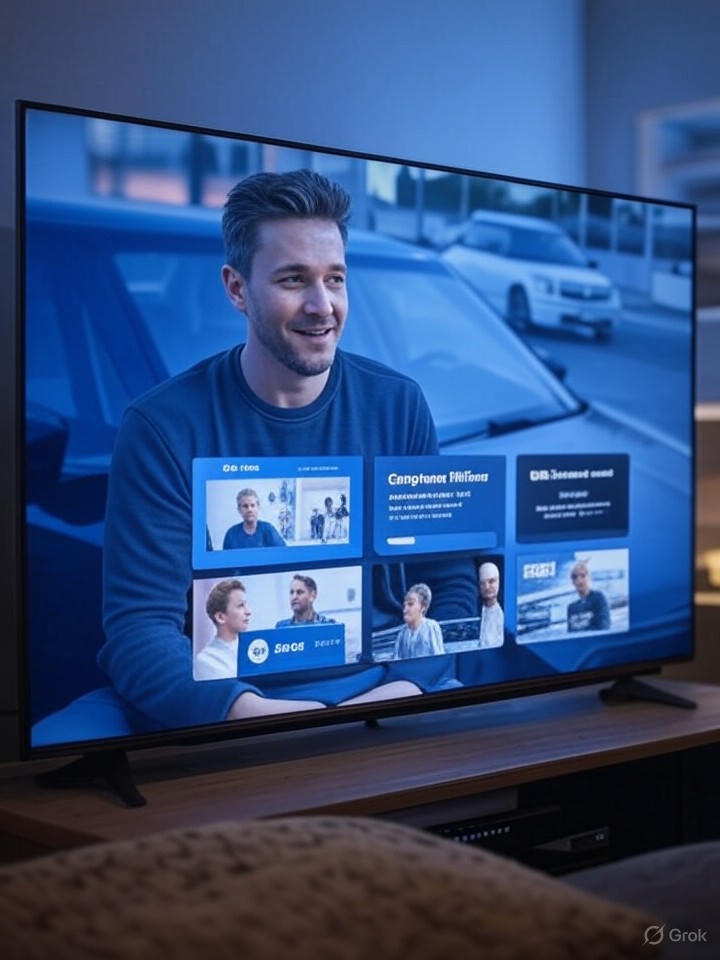Top Stories
DirecTV Unveils AI-Powered Ads Featuring User Likenesses in 2026

UPDATE: DirecTV is set to revolutionize advertising in 2026 with AI-generated ads featuring viewers’ own likenesses, transforming how brands engage audiences. This groundbreaking initiative, in partnership with Glance, will turn idle screens into interactive, shoppable experiences, starting early next year.
As consumers become increasingly accustomed to personalized content, the integration of artificial intelligence into DirecTV’s advertising strategy highlights the urgent shift in the streaming landscape. The satellite TV provider aims to leverage its expansive subscriber base of over 12 million to boost engagement and revenue through tailored advertisements.
Starting in early 2026, users of DirecTV’s Gemini streaming devices will see their own avatars in ads, depicting scenarios such as trying on clothes or using products. This innovative technology utilizes on-device AI to analyze viewing habits and preferences, ensuring a personalized experience. However, DirecTV emphasizes that participation is entirely opt-in, with strong privacy controls in place to protect user data.
According to recent reports from CNET, this move comes as DirecTV faces increasing pressure from competitors like Netflix and Amazon Prime Video, who are also exploring ad-supported models to counteract the decline in traditional cable subscriptions. The shift towards AI-driven content is expected to enhance viewer interaction, with pilot tests showing engagement rates up to 30% higher than standard ads.
“This initiative signals a new era where AI doesn’t just recommend content but actively involves users,”
a Glance spokesperson stated. The partnership aims not only to generate ad revenue but to also provide users with trending news, weather updates, and entertainment snippets personalized to their interests.
Industry experts are closely watching the implications of this technology on privacy and consumer experience. Critics are concerned that the use of personal imagery could lead to intrusive advertising practices, echoing wider debates about AI in personal spaces. DirecTV assures that all personalization features will be optional, aligning with regulations such as the California Consumer Privacy Act, which mandates strict data protection measures.
As the landscape of television advertising evolves, the potential for AI-generated ads to reduce production costs and increase personalization is significant. Brands can engage consumers more effectively without the need for traditional models and production shoots. However, as highlighted by Engadget, the rollout will include options for users to disable this feature, addressing potential backlash and maintaining user trust.
Looking ahead, industry insiders speculate the technology could extend beyond screensavers to full programming interstitials, positioning DirecTV as a leader in AI-enhanced viewing experiences. This shift could influence competitors to adopt similar tactics, reshaping the economics of television.
The move by DirecTV is not just a technological advance; it’s a crucial economic strategy in a rapidly changing media environment. With consumer preferences shifting towards personalized experiences, the success of this initiative will depend on balancing innovation with user trust.
As regulatory scrutiny on AI ethics intensifies, the stakes are high. DirecTV’s bold step into AI-driven advertising could redefine how audiences engage with content, but it must navigate the fine line between personalization and privacy.
Stay tuned for more updates on this developing story as DirecTV prepares to launch this innovative advertising model in 2026.
-

 Science2 weeks ago
Science2 weeks agoIROS 2025 to Showcase Cutting-Edge Robotics Innovations in China
-

 Politics2 weeks ago
Politics2 weeks agoJudge Considers Dismissal of Chelsea Housing Case Citing AI Flaws
-

 World2 weeks ago
World2 weeks agoBravo Company Veterans Honored with Bronze Medals After 56 Years
-

 Lifestyle2 weeks ago
Lifestyle2 weeks agoStone Island’s Logo Worn by Extremists Sparks Brand Dilemma
-

 Health2 weeks ago
Health2 weeks agoStartup Liberate Bio Secures $31 Million for Next-Gen Therapies
-

 Top Stories2 weeks ago
Top Stories2 weeks agoIndonesia Suspends 27,000 Bank Accounts in Online Gambling Crackdown
-

 Sports2 weeks ago
Sports2 weeks agoMel Kiper Jr. Reveals Top 25 Prospects for 2026 NFL Draft
-

 Health2 weeks ago
Health2 weeks agoTop Hyaluronic Acid Serums for Radiant Skin in 2025
-

 World2 weeks ago
World2 weeks agoHoneywell Predicts Record Demand for Business Jets Over Next Decade
-

 Politics2 weeks ago
Politics2 weeks agoNew Jersey Voters Urged to Register Ahead of November Election
-

 Lifestyle2 weeks ago
Lifestyle2 weeks agoMary Morgan Jackson Crowned Little Miss National Peanut Festival 2025
-

 Sports2 weeks ago
Sports2 weeks agoYamamoto’s Mastery Leads Dodgers to 5-1 Victory in NLCS Game 2









